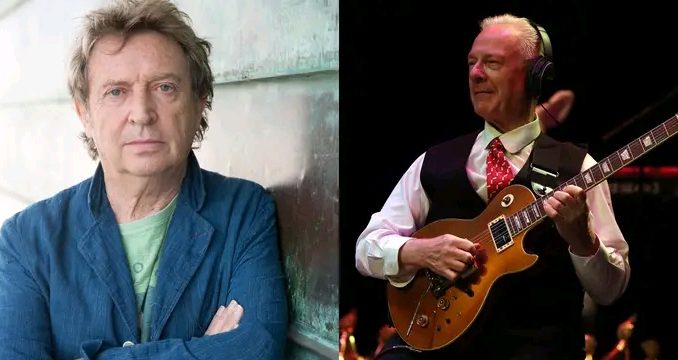
While we may know Andy Summers as a member of one of the greatest rock bands of all time, he’s way more than that. Of course, we can notice Andy’s jazz background in The Police as well, but it’s his solo work and other projects that show how diverse he is, including the latest album, “Vertiginous Canyouns.”
However, one of the most interesting collaborations in the world of guitar has to be Andy Summers teaming up with Robert Fripp. Together, Andy and the King Crimson leader recorded two albums, 1982’s “I Advance Masked” and 1984’s “Bewitched.” While recently appearing in Ultimate Guitar’s On the Record podcast, Summers discussed working with Robert Fripp, giving us a glimpse into the legendary progressive rock guitarist’s way of work.
**I wanted to ask you about working with Robert Fripp in the early ’80s. What did you take out of that experience? How was that experience for you working with Fripp?**
“Well, Fripp and I, that situation was not normal. We both came from the same town in England, and he was this other guy that I’d heard about, but I’d never met him. I don’t think I did… Maybe I met him once in the town I came from in England. There are a few bands, rockers, and young kids with guitars who want to be guitar players.”
“They were all obsessed with music and wanting to be guitarists. And Fripp was this sort of outlier because he wasn’t in the main town, but he was in another smaller English town that was close by.”
“The weird thing was I played in this hotel. I was like 16 years old, and I got a gig and became a professional musician at 16 in this hotel group until they threw me out for chasing the girls there, and Fripp took over from me. It was a weird kind of karma. He became the next guitar player and he was a very different player, and I can’t remember much else in between, except many years later, he helped me out. He got me a gig before I was in The Police.”
“I lived in California and then I came back to England and there was a whole scene in London, and I met Robert one night, and I was trying to get started again into playing in England, and he got me hooked up. Then years passed, and now I’m in the biggest band in the world. And I started to get the feeling of wanting to want to do something else outside of the band, just to sort of prove that I could do it musically, because I was so used to playing the same Police songs over and over and over again.”
“But my interest in music obviously was urging me to try other forms and other ways of playing. Then I had this idea of trying to do a guitar duet with Robert, particularly because we had this local tie-up in our lives from the same town. He was famous, I was famous, there’d probably be an interest in it.”
“So we got together in New York. Actually, I remember we got together in someone’s apartment in the village and were jamming, trying to see what we could come up with and what the music would be. I could do what I could do, and Robert has got his particular style too, that sort of polyrhythmic way of playing the guitar.”
“And then we actually went back to our hometown in England. There was a little recording studio, which was also run by a guy that we grew up with. It was called Arny’s Shack, a peculiar little recording studio. He was a sort of eccentric. He smoked a pipe while he recorded. We got there, and then we just started working things out.”
“So oddly that you ask this because, right now, let’s see, about 18 months back, he’s working with a guy who said, ‘I know you’ve got all those tapes, that you and Robert did,’ and there must be more material. He was very agitated about it — he works with Robert. I said, ‘Yeah, well, I’ve got them, but they’re all in storage.’ All the two-inch tapes, we put them away.”
“He said, ‘I’d really like to listen to those. Can you get them?’ So we kind of had to go through the motions but eventually, the tapes got out of the storage. They got sent and he got them in England. He reduced them down to whatever. And there’s about 12 other tracks. So he obviously worked on them.”
“I don’t know if he mixed them, because most of it was done with two or three guitars, but I was quite… I don’t know, perhaps ‘shocked,’ is too strong a word, but we got them and I was kind of knocked out – they’re great tracks. I thought, ‘My God, why didn’t we put these on the album?'”
“We did two albums, so out of nowhere, there’s a third album, and I think that’s coming out in September, in a package, on Robert’s own label, which I’m fine with. So that’s the whole Fripp story. And of course, he’s sort of resurfaced in recent years with his wife, Toyah, you know, because he’s not in King Crimson anymore.”
**Those were incredible albums, and I’m really excited to hear the third installment.**
“Well, it was surprising. I went, ‘God, why didn’t we do this? Why was I throwing those out?’ Because I was essentially the producer. But listening to some of these songs all these years later, I thought I’d listen to them and think, ‘Oh, my god, well, I see why. They were no good. They’re terrible. That’s why we didn’t use them.'”
“But they weren’t. They’re all really much like the other tracks that we actually put out. And my god, it’s a good album. So who knows where that’s going.”
Leave a Reply